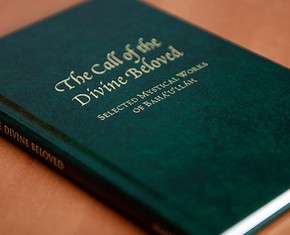The views expressed in our content reflect individual perspectives and do not represent the authoritative views of the Baha'i Faith.
Reading the great spiritual teachings can fill us with inspiration, insight, and guidance. The soul is soothed when it understands more about why and how it was created.
That knowledge comes from the Creator through His divine messengers – and reading the words of those prophets delivers their messages straight to our inmost beings.
All the scriptures mention and glorify the names of God repeatedly. For example, the Qur’an mentions over a hundred unique divine attributes, describing God as merciful, compassionate, mighty, wise, knowing, and clement. The Bible says: “God is light, and in him is no darkness at all.”
RELATED: All Faiths Are One Faith
The writings of the central figures of the Baha’i Faith – Baha’u’llah, the Bab, and Abdu’l-Baha – frequently mention the attributes of God. Many Baha’i prayers start with God’s glorification and end with mention of His names and characteristics. Some of these names from Baha’u’llah’s writings include: the All-Perceiving, the Exalted, the All-Merciful, the Knower of things unseen, the Most Holy, the All-Praised, the Great Giver, the Ever-Forgiving, the Most Powerful, and the Most Compassionate.
We’re all familiar with these attributes, even though we may not be part of any religion, because we have had to deal with them in our daily lives.
For example, when we’re victimized, we have to deal with the question of whether to forgive or avenge the wrongdoings of others. Suffering makes us think long and hard. Can we be ever-forgiving, as God is? If someone strikes us, can we turn the other cheek, as Christ advised? In other words, do we have the capacity to pardon the actions of others, no matter how unjust?
Yes, we do have that capacity. Every human being does. We can decide whether to fight or forgive. In one instructive instance recently, the sole survivor of a rampage in which her husband and four children died not only forgave the killer but also prayed for him.
The holy scriptures of all the great Faiths teach us to dig deeper and not be satisfied with the superficial practice of any divine attribute. For example, it is easy to love a friend or a family member, but would you love someone who has harmed you? Would you love an enemy?
According to the holy books, God’s love encompasses every person. For an ever-forgiving God, forgiving any wrong, regardless of the severity, is not out of the question. There is great merit in choosing the high road: in doing so we align ourselves with God’s knowledge. All religions are springs of fresh wisdom that carry yearning souls closer to their Beloved and help them detach from the transitory things of this world, connecting them to the Holy Spirit.
The founders of the world’s Faiths obey the promptings of the same spiritual knowledge. For Moses this Holy Spirit was symbolized in the form of a burning bush, for Jesus a dove, for Muhammad the angel Gabriel and for Baha’u’llah the Maid of Heaven. The Holy Spirit instructs them, to the extent that every moment of their lives, whatever they say or do is a consequence of their obedience to the Holy Spirit.
Humans also feel the power of the Holy Spirit. In a talk he gave in London, Abdu’l-Baha explained:
Today the light of Truth is shining upon the world in its abundance; the breezes of the heavenly garden are blowing throughout all regions; the call of the Kingdom is heard in all lands, and the breath of the Holy Spirit is felt in all hearts that are faithful.
To receive the divine bounties available to us, we must be continually receptive to them. The good news: the outpouring of these blessings is continuous and abundant. All we have to do is turn our antenna in the right direction.
All the wonders of this age, manifested in new sciences and arts, in an emerging global consciousness, a new awakening in human rights, and the pursuit of justice – all are inspirations of the Holy Spirit. No human development can happen without this force.
RELATED: The Evolution of Religion: The Mystery of Divinity
But sometimes the path looks extremely bleak, and we don’t feel the presence of God in our lives. Regardless of our spiritual state, however, God continues to shine on your spirit as He always does, according to Baha’u’llah’s assurance:
Consider, moreover, how frequently doth man become forgetful of his own self, whilst God remaineth, through His all-encompassing knowledge, aware of His creature, and continueth to shed upon him the manifest radiance of His glory. It is evident, therefore, that, in such circumstances, He is closer to him than his own self. He will, indeed, so remain forever, for, whereas the one true God knoweth all things, perceiveth all things, and comprehendeth all things, mortal man is prone to err, and is ignorant of the mysteries that lie enfolded within him …
In times of remoteness from the Divine Presence, examine your spiritual account. Read the holy words the great spiritual messengers revealed for us, and make them an integral part of your life. Seek to pick up the broken pieces, put them back together and fly again. Keep in mind that we are always under the watchful eyes of God. He sees us through His kind, generous and compassionate eyes, just as loving parents see their children.
When we do manage to show forth the names and attributes of God, we have entered the phase of re-creating ourselves as beautiful souls. When we struggle to reflect the attributes of God, even when it seems hard for us to love or to forgive, we gain insight into God’s names, the All-Loving or the Ever-Forgiving. This knowledge of God carries us forward into the worlds of the spirit.
















Comments
Sign in or create an account
Continue with Googleor